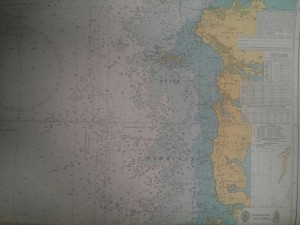[cs_content][cs_section parallax=”false” separator_top_type=”none” separator_top_height=”50px” separator_top_inset=”0px” separator_top_angle_point=”50″ separator_bottom_type=”none” separator_bottom_height=”50px” separator_bottom_inset=”0px” separator_bottom_angle_point=”50″ class=”cs-ta-left” style=”margin: 0px;padding: 0px;”][cs_row inner_container=”true” marginless_columns=”false” style=”margin: 0px auto;padding: 0px;”][cs_column fade=”false” fade_animation=”in” fade_animation_offset=”45px” fade_duration=”750″ type=”1/1″ style=”padding: 0px;”][cs_text]
[/cs_text][cs_text]
An extensive programme of learning Each year we run courses from introductory ‘try dives’ right up to BSAC’s level 4 qualification – Advanced Diver. You can progress from your first breath underwater to managing your own diving expedition for other club members. Read more below about each step along the path…
We also offer a broad range of skills development courses – see below for details.
If you’re interested in any of our training, just email Nathan on [email protected] to find out more. For the cost of any of our courses please see our fees page.
[/cs_text][x_accordion][x_accordion_item title=”TRY DIVE” open=”true”]
For try dives see here
[/x_accordion_item][x_accordion_item title=”REFRESHER” open=”true”]
Refreshers are free for club members. For non-members: see here
[/x_accordion_item][x_accordion_item title=”DRY SUIT TRAINING” open=”true”]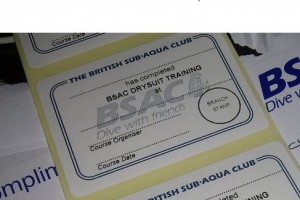
This course aims to teach members the correct and safe techniques for drysuit diving. It may be conducted over a series of Branch meetings or may be run as a specific one-day course.
Training includes a theory lesson, 2 sessions in the swimming pool than then 1 open water lesson.
[/x_accordion_item][x_accordion_item title=”OCEAN DIVER (level1)” open=”true”]
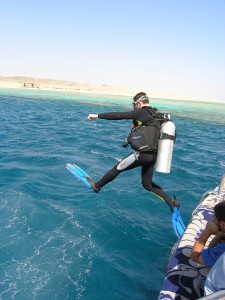
The start of the journey!
Our beginners’ course provides the essential knowledge and skills needed to prepare for open water diving in the UK.
Theory lessons and swimming pool lessons build the skills required for a series of sheltered water training dives where we gradually build experience, confidence and depth progression to a maximum depth of 20m.
.
What will I be able to do when I’m qualified?
- Dive anywhere in the world on the vast majority of commercially advertised itineraries with your internationally recognised qualification
- Dive on nearly all our club trips (only a couple each year are for Sports Divers and above)
- Dive to a maximum depth of 20 meters
- Dive in a dry suit
- Dive breathing Nitrox as a way of improving safety margins
- Basic rescue skills
- Dive in buddy pairs without needing a dive guide in the water
How long does the course take?
It depends on the student – we go at your pace and we don’t progress faster than your own comfort and confidence. We typically start in the Autumn and qualify students before Easter so they are ready for the start of the UK dive season.
Why should I do this rather than e.g. PADI Open Water?
PADI OW only qualifies you to dive to to 18m and doesn’t include dry suit, nitrox or rescue skills – which you have to pay a lot extra for. You don’t even get these if you do PADI Advanced Open Water – which, despite being their second level qualification, is in many ways a lesser qualification than BSAC Ocean Diver.
In addition PADI courses are run on a fixed timetable which means many students find themselves rushed through the syllabus and qualified before they have developed confidence in the skills they are learning. That’s because PADI want your money while we want a new friend and club member who can be our buddy when we go diving.
[/x_accordion_item][x_accordion_item title=”SPORTS DIVER (level2)” open=”true”]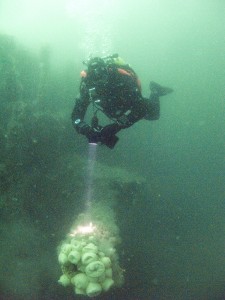
If you already have a level 1 diving qualification such as Ocean Diver, PADI Open Water or PADI Advanced Open Water then the BSAC Sports Diver course is for you!
This will extend your knowledge to give you all the skills you need for independent UK and worldwide diving.
If you’ve never dived in the UK before this course will also provide you with a dry-suit diving qualification and experience.
.
What will I be able to do when I’m qualified?
- Dive on any commercially advertised dive holiday – and expect to be one of the most competent and highly qualified divers on the boat!
- Go on any club trip
- Dive to a max depth of 40m
- Plan and conduct dives requiring decompression stops
- Use all the toys needed for UK diving such as SMBs, DSMBs, distance lines, compasses
- Use nitrox to extend maximum dive times
- More advanced rescue and life saving skills
- Get more involved with the management of diving on club trips by assisting the dive manager
- Start the technical training programme if you want to dive with twinsets, rebreathers etc
- Start the instructor training programme if you want to introduce the next generation to our sport
How long does the course take?
In addition to the theory and practical sessions the course requires a build up of diving experience in a range of conditions. As with Ocean Diver we don’t move faster than the student’s confidence and ability level is developing. Keen and able students can get through it all in 4 months or so, but some students need longer.
[/x_accordion_item][x_accordion_item title=”DIVE LEADER (level3)” open=”true”]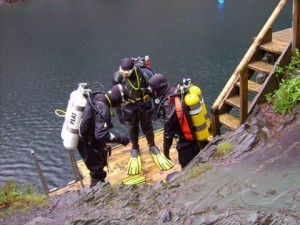
Already an experienced and competent diver? What’s next?
How about pushing yourself to become highly competent diver above and below water and a highly valued and respected club member?
As a BSAC Dive Leader all the doors are unlocked and the sky is the limit!
What will I be able to do when I’m qualified?
- Plan and run club dive trips to any of our familiar destinations (which for our club is pretty much anywhere!)
- Advanced personal diving skills including using lift bags and doing mid-water DSMB deployments
- Advanced rescue and life saving skills including coordinating and managing rescue efforts
- Able to lead any diver on a dive – including unqualified divers (so long as they are within their previous experience)
- Able to extend the experience of less qualified divers by leading them on new types of dives
- Become an Open Water Instructor
- Move on to more advanced technical training
How long does the course take?
Dive Leader requires a high level of personal commitment and motivation to complete. While it is technically possible to complete the course within a year, 2 years would be a very good effort and some students take significantly longer. There is no upper limit! It’s a lot to take on and anyone successfully completing can be truly proud of their achievement.
[/x_accordion_item][x_accordion_item title=”ADVANCED DIVER (level4)” open=”true”]
Want to join the elite few who make it to the top level of club diving?
Want to do super-adventurous diving and organise challenging diving expeditions that will extend yourself and other club members?
Almost nobody gets this far… can you?
.
What will I be able to do when I’m qualified?
- Plan diving expeditions to unknown and unfamiliar places taking into account all the associated logistics and risk management.
- Plan and conduct a wide range of advanced diving including decompression trapezes, search-and-recovery dives and much more
- More advanced seamanship, chartwork and position fixing
- Become a BSAC Advanced Instructor
- Start thinking about the ultimate… First Class Diver
How long does the course take?
This course is much less about formal lessons and more about the structured broadening of experience. Developing good judgement and a high level of organisation and leadership qualities takes time – as of course does building experience by running lots of dive trips and logging lots of dives in a broad range of conditions. Typically students get there in around 3-4 years, but there is no upper limit.
[/x_accordion_item][x_accordion_item title=”SKILLS DEVELOPMENT” open=”true”]
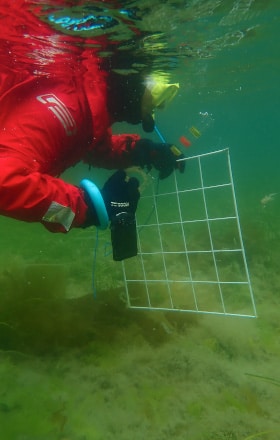
Accelerated Decompression Procedures, Boat Handling, Buoyancy and Trim, Chartwork and Position Fixing, Dive Planning and Management, Dry suit, First Aid for Divers, Lifesaver (+Advanced), Marine Life Appreciation, Nitrox, O2 Administration, Primary Donate, Practical Rescue Management, Search and Recovery, Sidemount, Twinset, Underwater Photography, Underwater Surveyor, Wreck Appreciation, Wreck Diver (+Advanced).
Courses are run as and when members request them assuming there is sufficient uptake and instructor availability. Please enquire for pricing and availability.
.[/x_accordion_item][/x_accordion][/cs_column][/cs_row][/cs_section][/cs_content]

